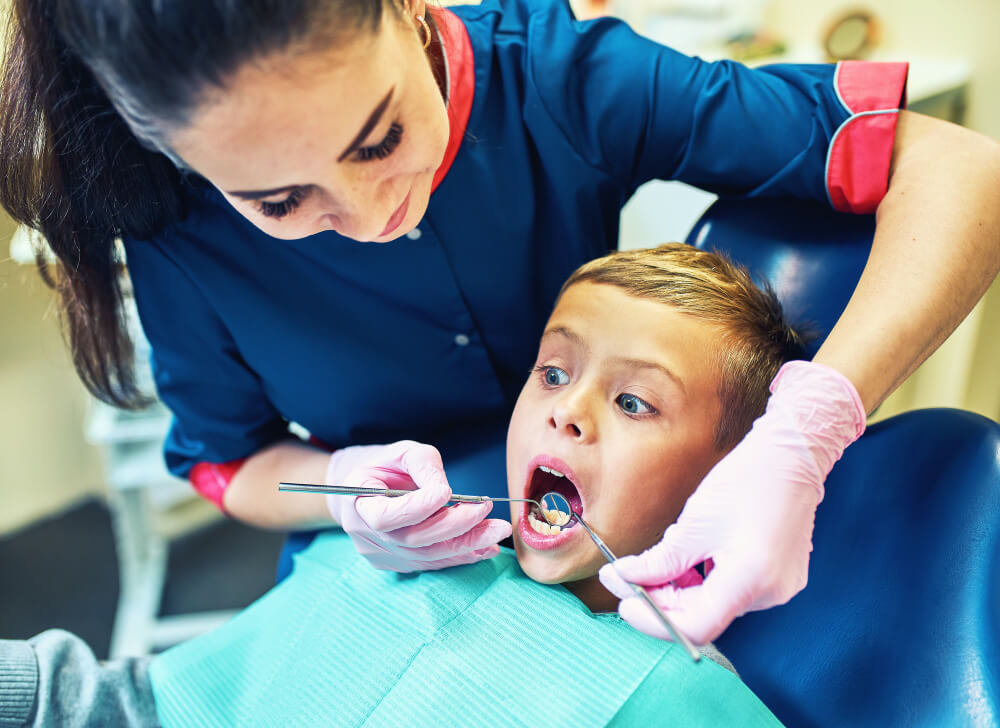
Anytime the mind wanders to the dentist, it naturally thinks about adult teeth. But believe it or not, baby teeth—or primary teeth—are also very important. Though small in size, they play an enormous role in the overall health and development of a child dentistry
What is a child tooth, and why is it so important?
Baby teeth, otherwise known as primary teeth, are the very first set of teeth that a child obtains. Erupting into the mouth starting at approximately six months of age, they remain in the mouth until a child reaches about 12 years of age, when they start falling out and adult teeth replace them.
Although the teeth are temporary, they are very important for a number of reasons:
- Helping to Speak: With the eruptions of the baby teeth, children are able to learn proper ways of speech and master it. They help to develop certain word pronunciations or phonetic sounds. If the baby teeth are absent or in bad shape, it may be rather difficult for a child to utter some words. Poor speech may affect his confidence.
- Good Nutrition: Baby teeth are responsible for chewing food into smaller, more digestible pieces; this makes eating and proper nutrition intake easier for children. When teeth are decayed or missing, it hurts to eat certain foods, so children stop eating those foods. This can lead to malnutrition due to a lack of essential nutrients needed to grow and maintain healthy development.
- Space for the Bigger Ones: The baby teeth stand as space holders in the mouth for later adult teeth to grow and develop. They guide the adult teeth for correct positioning. In an event where a baby tooth is lost prematurely because of either dental caries or an accident, other teeth in the surrounding area tend to drift into part of the space, leaving insufficient space to guide in usefulness and alignment of adult teeth.
- Creating a Healthy Smile: A set of healthy baby teeth can help kids to feel proud of their smile. As kids have a nice smile, they are more confident. They are happier to intermingle with others. A very positive self-image that starts from early childhood may last forever.
What If Child Teeth Are Not Cared For?
Poor care of the baby teeth can cause problems that impact child health and well-being. This is what might go awry when baby teeth are not taken care of:
- Pain and Discomfort: When there is a cavity or tooth decay, it might cause pain. This could be generally uncomfortable including when chewing, talking, and sleeping. Kids may reject some foods because of pain or even get fussy.
- Infections: If a cavity is left untreated, it can develop into an infection. The infection may further spread and create bigger problems that at times require emergency care, sometimes even hospital visits.
- Problems with Adult Teeth: In the case of baby teeth, tooth decaying hurts the adult teeth coming up from under the gums. This might make the grown-up teeth coming out crooked or discolored.
- Expensive Treatments: The treatments for dental problems with the baby teeth are very expensive: fixes, fillings, crowns, and extractions can be costly. Prevention is always less expensive than treatment and less traumatic for the child.
Why Is Early Dental Care So Important?
The care of the baby teeth sets the stage for a lifetime of healthy teeth. Why is early dental care important?
- Creating Healthy Behavior: It is usually through habit formation that kids learn to brush their teeth twice a day, floss, and regularly visit the dentist. Kids starting these habits early are far more likely to carry them into adulthood.
- Early Visits to the Dentist: Early visits to the dentist teach parents and children how to maintain healthy teeth. Dentists can answer questions about brushing, flossing, and good diet.
- Positive Experiences: Early dental visits help kids get used to the dental office environment. Kids that have positive dental visits will not fear or be apprehensive about future dental visits.
Importance of child Teeth
Baby teeth are not just placeholders for adult teeth but play several critical roles in early childhood:
- Oral Skills Development: It also aids in the development of oral skills, letting a child learn how to chew and talk properly. The teeth will help your child pronounce certain words correctly. Also, the presence of milk teeth allows your children to eat a wide range of foods when they are gradually switching from pureed foods to more solid ones.
- Space Maintenance for Permanent Teeth: Primary teeth act as space maintainers for permanent teeth. They guide permanent teeth in their proper placement at the appropriate times when they start erupting. If one primary tooth were to fall out early due to decay or trauma, there would be a possibility of misalignment and crowding of permanent teeth.
- Allow for Proper Growth and Development: Healthy baby teeth facilitate proper jaw growth and facial development. They determine the positioning of the jaw and facial bone structure, which would be very important in the aesthetic and functional aspects.
The Consequences of Neglecting Baby Teeth
Negligence in the care of baby teeth can lead to a variety of problems that might impact a child’s health and well-being:
- Tooth Decay and Cavities: Baby teeth can decay just like permanent teeth. When cavities occur in baby teeth, this makes for a painful and uncomfortable child who will have difficulty eating and talking. If cavities are not treated, they could lead to more severe infections and problems that may affect the development of permanent teeth.
- Speech Development: These decayed or missing baby teeth hamper proper speech development. Since the baby teeth help in learning pronunciation and formation of sounds, the loss of them at times delays or affects the speaking habits of a child.
- Emotional and Social Effects: Dental problems can make a child feel insecure and withdrawn during social interactions. Kids who have noticeable dental problems tend to be conscious about their looks, which holds back their confident manner and social development.
Tips for Taking Care of Baby Teeth at Home
Here are some simple tips to help you take care of your child’s baby teeth:
- Brush Twice a Day: Brush your child’s teeth in the morning and before bed with a small toothbrush and soft bristles. Using a pea-sized amount of fluoride toothpaste is recommended. Help your child brush their teeth until they can do it on their own, usually around age 7 or 8.
- Floss Daily: Food and plaque that are not removed with brushing can result in cavities between the teeth. Regular flossing helps prevent cavities and gum disease. Floss your child’s teeth as soon as they have two touching teeth.
- Wholesome Diet: Let your child stick to a healthy diet, brimming with fruits, vegetables, and whole grains. Avoid sweetened snacks and beverages, as sugar helps in the development of dental caries.
- Regular Dental Checkups: Routine visits to the dentist should be scheduled, roughly once every six months for your child. Regular check-ups nip the problem in the bud and keep the teeth in good shape.
- Limit Sugary Drinks: Try to limit sugary drinks like soda and juice. These can increase the risk of tooth decay. If your child does consume sugary drinks, encourage them to drink water afterward and brush their teeth.
Creating a Positive Dental Experience
Among the most important elements to effective early dental care is to make the process positive for children. Here are some suggestions to help ensure your child’s initial experience at the dentist is a fun one:
- Start Early: Involve your child in dental care at a tender age. As soon as their teeth appear, clean them; schedule an early first dental visit to familiarize your child with the dental office.
- Praise and Reward: Praise your child for cooperation during dental visits and reward them with small incentives.
- Pick a Child-Friendly Environment: For this, the student will observe a dental clinic with a child-friendly environment, and that of the staff if they cater toward young people. Aurora Smiles NY is known for a friendly ambiance and soft approach in pediatric dentistry.
Conclusion
Temporary fillings as baby teeth are, they are essential for a young person’s oral health while growing and developing in their entire well-being. Early dental care is very significant to ensure these milk teeth serve their purpose well and contribute to a healthy start for the permanent teeth. A visit to an expert child dentistry in Mt Vernon, NY, such as Dr. Amul Patel at Aurora Smiles NY, will give your child the best start into their dental lives. By providing your child with early dental care, you will be investing in their health and happiness in the future—one smile at a time.
